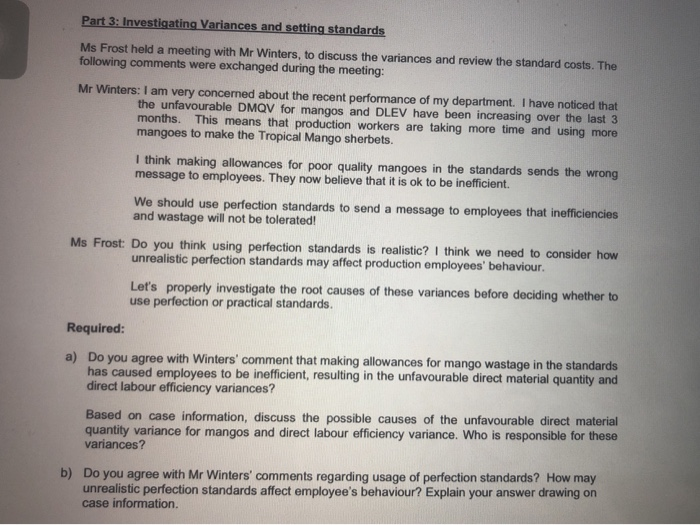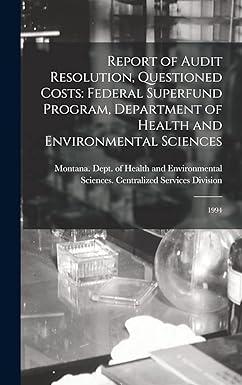Part 3: Investigating Variances and setting standards Ms Frost held a meeting with Mr Winters, to discuss the variances and review the standard costs. The following comments were exchanged during the meeting: Mr Winters: I am very concerned about the recent performance of my department. I have noticed that the unfavourable DMQV for mangos and DLEV have been increasing over the last 3 months. This means that production workers are taking more time and using more mangoes to make the Tropical Mango sherbets. I think making allowances for poor quality mangoes in the standards sends the wrong message to employees. They now believe that it is ok to be inefficient. We should use perfection standards to send a message to employees that inefficiencies and wastage will not be tolerated! Ms Frost: Do you think using perfection standards is realistic? I think we need to consider how unrealistic perfection standards may affect production employees' behaviour. Let's properly investigate the root causes of these variances before deciding whether to use perfection or practical standards. Required: a) Do you agree with Winters' comment that making allowances for mango wastage in the standards has caused employees to be inefficient, resulting in the unfavourable direct material quantity and direct labour efficiency variances? Based on case information, discuss the possible causes of the unfavourable direct material quantity variance for mangos and direct labour efficiency variance. Who is responsible for these variances? b) Do you agree with Mr Winters' comments regarding usage of perfection standards? How may unrealistic perfection standards affect employee's behaviour? Explain your answer drawing on case information Part 3: Investigating Variances and setting standards Ms Frost held a meeting with Mr Winters, to discuss the variances and review the standard costs. The following comments were exchanged during the meeting: Mr Winters: I am very concerned about the recent performance of my department. I have noticed that the unfavourable DMQV for mangos and DLEV have been increasing over the last 3 months. This means that production workers are taking more time and using more mangoes to make the Tropical Mango sherbets. I think making allowances for poor quality mangoes in the standards sends the wrong message to employees. They now believe that it is ok to be inefficient. We should use perfection standards to send a message to employees that inefficiencies and wastage will not be tolerated! Ms Frost: Do you think using perfection standards is realistic? I think we need to consider how unrealistic perfection standards may affect production employees' behaviour. Let's properly investigate the root causes of these variances before deciding whether to use perfection or practical standards. Required: a) Do you agree with Winters' comment that making allowances for mango wastage in the standards has caused employees to be inefficient, resulting in the unfavourable direct material quantity and direct labour efficiency variances? Based on case information, discuss the possible causes of the unfavourable direct material quantity variance for mangos and direct labour efficiency variance. Who is responsible for these variances? b) Do you agree with Mr Winters' comments regarding usage of perfection standards? How may unrealistic perfection standards affect employee's behaviour? Explain your answer drawing on case information







